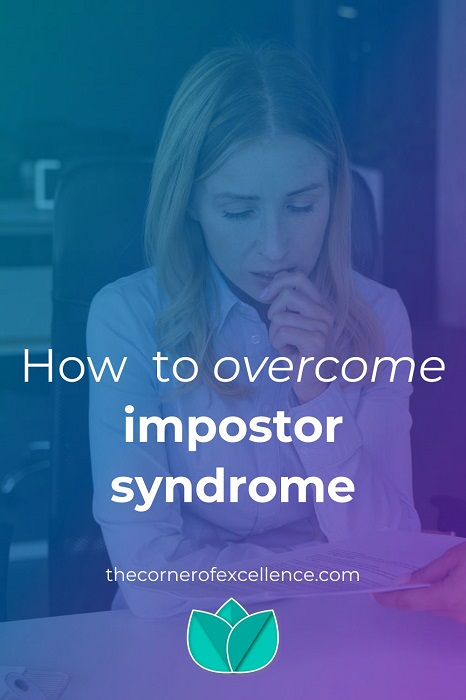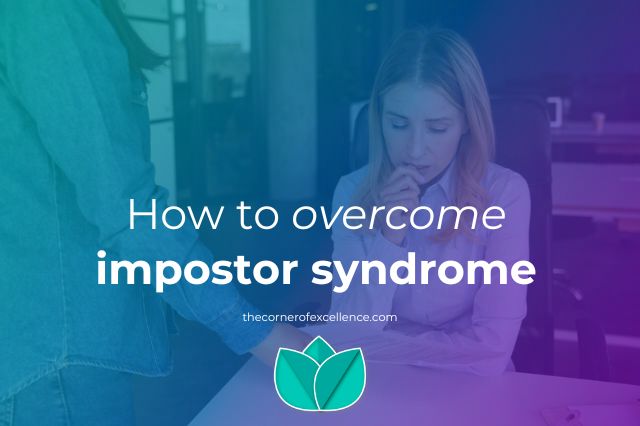
Do you ever feel like a fraud? Do you feel that you do not deserve any achievement or recognition? Do you dread facing certain challenges? Or do you not move forward with certain goals because something seems to hold you back? These are all possible signs of the impostor phenomenon. Let us see what impostor syndrome is and how to overcome it.
What is Impostor Syndrome?
Impostor syndrome is a pattern of self-sabotage. It is also known as fraud syndrome or impostor phenomenon. Basically you doubt yourself, your abilities and achievements. You think you do not deserve success and you fear failure.
If something goes wrong, it is a confirmation of your theory that you are an impostor. And if you do something right, you put it down to good luck or chance. When we suffer from the impostor phenomenon, we think that others are more valid than us. We believe that if they discover how we are, with our weaknesses, our doubts and fears, they will realise that we are a fraud.
The term impostor syndrome was first used by psychologists Suzanna Imes and Pauline Rose Clance in the 1970s. Initially it was thought to affect mainly high-achieving women. Since then it has been recognised that the impostor phenomenon can affect anyone, regardless of their social status, background, skill level and experience.
Situations in which the fraud syndrome affects us
The impostor syndrome can overcome us in a variety of situations in which we are faced with some challenge or novelty.
Perhaps you are proposed a talk, a course or something similar. Despite controlling the subject, you have a thousand doubts. Maybe you get offered a promotion or you are looking for a job change. Suddenly you begin to doubt your abilities and your experience to hold the position.
Perhaps you are starting as an entrepreneur but you sabotage yourself. You do not promote yourself enough. Maybe because you do not have the same experience as others in your field. Perhaps for fear of making a fool of yourself or fear of what they will think of you. Or you do not move forward with key tasks like defining your service offering because you feel stuck.
You may be nominated for an award but you do not feel worthy. It can even happen to you on a personal level. Perhaps you are worried about something related to your children or you get very nervous before parent meetings because you feel like an impostor as a mother or father.
Suppose you agree to give a talk on a topic you know nothing about. In this case the impostor syndrome would be justified. The problem is that this feeling usually overcomes us even if we have enough knowledge and experience. So, let us see why this happens.
Symptoms of the impostor phenomenon
There are several signs that can tell you if you suffer from impostor syndrome. Let us look at a few examples.
You do not trust your abilities. You also do not value your experience enough. Perhaps you worry a lot about any small mistake you make.
Maybe you believe you do not deserve your achievements, thinking that they are due to external factors such as chance, good luck or other people who helped you.
You may criticise your performance because you do not think it is good enough. Or you play it down when something comes naturally to you. Despite being critical of yourself, you react very sensitively to constructive criticism from others.
You downplay your abilities and your experience even if they surpass those of others.
Perhaps you fear failure and not meeting expectations. You are afraid of being discovered as a fraud. That is why you sabotage your own success. So, you do not do enough to achieve success. Or you set goals that are too ambitious and feel disappointed when you do not reach them; thus confirming your theory of being an impostor.
You feel constant dissatisfaction. Perhaps you feel unmotivated due to your lack of confidence. All of these self-sabotaging beliefs and behaviours can lead to sadness, anxiety, hopelessness, or depression.
Causes of imposter syndrome
We have seen the symptoms of the impostor phenomenon. But what is hidden behind? The situations and signs mentioned will have already given you some clues.
When fraud syndrome occurs, it is usually due to low self-esteem and lack of self-confidence. We may feel insecure because of previous experiences that did not turn out the way we wanted. Perhaps we spent a childhood or adolescence with a lot of criticism and we only felt loved and valued if we did things well.
That is why we always demand a lot of ourselves. But we are not able to assess our skills and abilities realistically. We compare ourselves to others thinking that they do things much better and deserve their achievements more than we do ours.
You may have become a perfectionist in order to meet your own high expectations and the ones you think others have of you.
The impostor syndrome usually hides fears of success, failure or lack of appreciation. We all want to feel loved and appreciated. That is why facing possible criticism or the feeling of not being enough scares us.
How to overcome impostor syndrome
If we want to overcome the fraud syndrome, the first step is to observe our behaviours and beliefs. The second step requires reflecting on the causes that are hidden behind. That means being brave enough to recognise your fears and accept that they are there.
All this requires self-knowledge. Therefore, I invite you to pay attention to your inner world, your thoughts and feelings. What do they want to tell you? How do you talk to yourself? Is your internal dialogue usually negative and undermines your confidence?
1. You are special
Remember that no one can know everything. You offer something special because of the combination of your acquired knowledge, your experiences, how you apply the knowledge, and how you see the world.
I suggest you make a list of your strengths and talents. If you have trouble, ask people you trust what they think you are good at and what they value in you.
As well, accept your failures. We all make mistakes. No one is born knowing everything. Instead of beating yourself up for your mistakes and failures, think about what you can learn from them. What can you do better next time?
Then I propose that you make another list of all your achievements. Reflect on everything you have accomplished throughout your life and the challenges you have overcome. What skills did you make use of? Which ones can you apply to the situation that is causing you impostor syndrome now?
Keep these lists with your strengths and achievements so you can reread them whenever you feel insecure or like a fraud.
2. How did you overcome the fraud syndrome before?
Think about whether you have faced the impostor phenomenon before and overcome it. How was the situation? What did you do? Which skills and resources did you use? How did you feel afterwards?
This exercise and those from the previous point will help you strengthen your self-confidence. You will also remember useful skills that you can apply to the new challenge you are facing.
3. What would you say to a good friend?
When we feel trapped by fear, we often have a hard time seeing the opportunities. Then it is useful to try to change your point of view and become an external observer of your situation.
To do this, a very useful exercise is to think about what you would say to a good friend who is suffering from impostor syndrome. How would you encourage them?
4. Beware of comparisons
Perhaps what makes you feel like a fraud are other people you think are better than you.
We think we know ourselves with our supposed weaknesses. But we only know the others by what we see, what they tell us and what they appear to be. Therefore, we often compare ourselves (and not our best version by the way) to a biased and incomplete version of others.
Therefore, the only valid comparison is with yourself: who you have been, who you are and how you want to be and what you want to achieve.
Looking at other people who have achieved what you are trying to do is only a good idea if you are not doing it to compare yourself but to investigate what steps they have taken. How did they start? What knowledge did they acquire?
But if you do that, then do not just try to copy them. You are you. So, look for a way that suits you and that you feel authentic achieving what you want.
5. Put yourself in the worst and the best case
Another useful exercise to overcome your fears is to put yourself in the worst and the best situation. First reflect on what is the worst that could happen if you face this challenge. This exercise can be quite revealing as to what is really holding you back.
Second, ask yourself what is the best thing that could occur. If you overcome that challenge or reach that goal, what other benefits does it bring? How will you feel? Try to visualise it in full detail. This second exercise will inspire confidence and motivate you.
6. Get going
Inactivity and procrastination leave room to ruminate on what worries or scares us. That way these fears only grow. But life is movement. When taking action, even little by little, doubts are usually dispelled.
So think about the challenge you are facing that is causing you the impostor phenomenon. Take the reins of the situation. What is the first step you can take? It does not matter how small it is.
Maybe it is a matter of looking for more information. Or asking someone who has experience. Perhaps you need to acquire some knowledge. Maybe you can prepare for the situation by rehearsing. It may be a matter of scheduling time slots in your agenda to think constructively about what you want to do or about ideas. Maybe you need to give yourself a deadline to stop procrastinating on a certain step. It all depends on the challenge you are facing.
7. Seek excellence and improvement
At the beginning I mentioned that a typical self-defence mechanism in case of impostor syndrome is perfectionism. But remember that perfection is an unattainable illusion. It just causes you stress and the feeling of not being good enough. It can even paralyse you and trap you into inaction. For fear of doing something less than perfect, you might decide not to even try.
It is much more productive and constructive to aspire to excellence as well as focus on learning and continuous improvement. That is, aspiring to give the best of yourself. Sometimes things will turn out better and other times worse. But you will have a clear conscience for having tried and doing the best you knew.
8. Practice gratitude
I know that it seems to be the new fashion and solution for everything. But as the saying goes: It is not happy people who are grateful; it is the grateful people who are happy.
So do not take for granted the good things that happen to you and the achievements you obtain. Feel grateful and proud. Congratulate yourself for what you accomplish, no matter how small the achievement. If you make it a habit, you will gradually stop underestimating your abilities, skills, experience and successes.
9. You are not alone
Lastly, remember that you are not alone with this feeling of impostor syndrome. Other people also have their doubts, insecurities and fears. But just as you try to hide it, so do they.
The difference between those who succumb to the fraud syndrome and those who achieve their goals is that the latter keep going despite their fears. They face them, accept them and move on in spite of them.
So share what you feel with trusted people. Maybe they can advise you on something that you had not realised. But above all, vocalising our fears often helps us gain more clarity and become aware of possible limiting beliefs. Often, just by saying things out loud, we come up with what is holding us back, or an idea, or a solution.
Do you suffer from the impostor phenomenon?
Have you ever felt like a fraud? What was the situation and what did you do? Did you back out or did you move on despite impostor syndrome? How did it make you feel?

Sharing is caring!





One Response
WOW! This article was amazing. Thank you so much. It is good to put a name on what I’ve been feeling my entire life. I will implement the tools you provided to overcome. I AM SPECIAL!
A million thank yous.